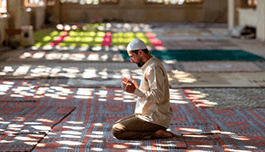Fasting one day and breaking the fast the next day is one of the best and most rewarding types of voluntary fasting in Islam. This form of fasting is known as the fasting of Prophet Dawud/David (alayhi salam) and consists of fasting for half a year.
Hadith 1
‘Abdullah bin ‘Amr reported that the Messenger of Allah (ﷺ) said:
“The most beloved prayer to Allah is the prayer of Dawud (peace be upon him), and the most beloved fasting to Allah is the fasting of Dawud. He used to sleep half the night, stand in prayer for one-third of the night, and sleep for one-sixth, and He used to fast one day and break his fast the other day.” (Narrated by al-Bukhari (1131), Muslim (1159), Abu Dawud (2448) and Ibn Majah (1712)).
Hadith 2
It was narrated from ‘Abdullah bin ‘Amr bin Al-As that it was mentioned to the Messenger of Allah (ﷺ) that he had said: “I will certainly stand all night (in prayer) and fast every day for as long as I live.” The Messenger of Allah (ﷺ) said: “Are you the one who said that?” I said: ‘I said it, O Messenger of Allah.’ The Messenger of Allah (ﷺ) said: ‘You cannot do that. Fast and break your fast, sleep and stand (in prayer), and fast three days of each month. For a good deed is equal to ten like it, and that is like fasting for a lifetime.’
I said: ‘But I am able to do better than that.’
He said: ‘Fast for one day and break your fast for two days.’
I said: ‘I am able to do better than that, O Messenger of Allah.’
He said: Your wife has a right upon you, your visitor has a right upon you, your body has a right upon you; so observe the fast of David, (peace be upon him), for he was the best worshipper of Allah. He used to fast one day and did not fast the other day.
I said: ‘I am able to do better than that, O Messenger of Allah’
The Prophet (ﷺ) then said: “There is no better fasting than that.” (Narrated al-Bukhari (1976), al-Nasa’i (2392) and Muslim (1159m)).
Lessons learnt from these hadiths:
- It shows the keenness of the Sahabah (companions) in worshipping Allah all the time and their desire to perform the maximum amount of good deeds. Are our desires to please Allah and attain paradise at the same level as the companions?
- It demonstrates the concern of the Messenger of Allah (ﷺ) for his companions, advising them not to overburden themselves in acts of worship or to neglect the rights of their bodies or of family members due to their desire to constantly worship Allah. He encouraged them, and the rest of the Ummah, to worship Allah in moderation and according to their abilities. When news reached the Messenger of Allah (ﷺ) that some people had vowed not to marry, eat meat or sleep at night he became angry and said: “What is the matter with these people who say such-and-such? I pray and I sleep, I fast and I break my fast, and I marry women. He who turns away from my tradition (sunnah) does not belong to me.” (Narrated by Muslim (1401)).
- These hadiths are evidence that fasting one day and breaking the fast one day is better than fasting all the time. By fasting every day, the body will become weak and the rights of others will be neglected. Fasting on alternative days, on the other hand, makes the body accustomed to it, while enabling it to regain strength on the non-fasting days and other people’s rights will be fulfilled. This form, although less in quantity, is more beneficial to the fasting person and more beloved to Allah. This is from the mercy of Allah, and all praise be to him, as He says in the Qur’an: “Allah intends ease for you and does not intend hardship for you.” (Q. 2:185).
- Whoever wishes to maximise their good deeds in the fasting category should adopt the fasting of Prophet Dawud (alayhi salam). It has been reported that many of the righteous predecessors would fast in this manner, and some would even fast more as long as they didn’t fast on the days on which fasting is prohibited (e.g. days of ‘Eid), harm their bodies or neglected the rights of their families upon them.






